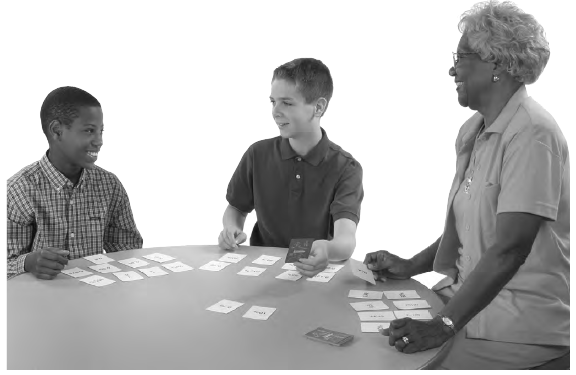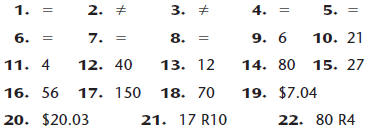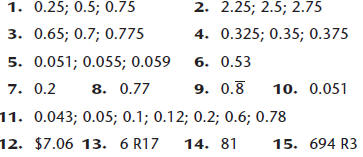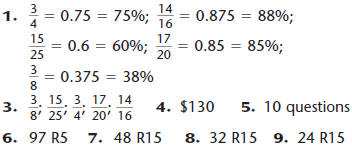Fractions
Fractions, Decimals, and Percents
Fractions, Decimals, and Percents
Unit 5 focuses on naming numbers as fractions , decimals, and percents. Your
child will use pattern blocks to
review basic fraction and mixed-number concepts as well as notations. Your child
will also formulate rules for
finding equivalent fractions.
In Fourth Grade Everyday Mathematics, your child learned to convert easy
fractions, such as  and 3/4, to
and 3/4, to
equivalent decimals and percents . For example, 1/2can be renamed as 0.5 or 50%.
Your child will now learn
(with the use of a calculator) how to rename any fraction as a decimal and as a
percent.
Unit 5 also introduces two new games: Estimation Squeeze, to practice estimating
products; and Frac-Tac-Toe,
to practice converting fractions to decimals and percents. These games, like
others introduced earlier, are
used to reinforce arithmetic skills . Both games use simple materials
(calculator, number cards, and pennies or
other counters) so you can play them at home.
Your child will study data about the past and compare it with current
information as the American Tour
continues.
Please keep this Family Letter for reference as your child works through Unit
5.

Vocabulary
Important terms in Unit 5:
bar graph A graph that uses horizontal or vertical
bars to represent data.
circle graph A graph in which a circle and its
interior are divided through its center into parts to
show the parts of a set of data. The whole circle
represents the whole set of data.
denominator The number below the line in a
fraction. In a fraction representing a whole, or ONE,
divided into equal parts, the denominator is the total
number of equal parts. In the fraction a/ b ,b is the
denominator.
equivalent fractions Fractions that have
different denominators but name the same amount.
For example, 1/2 and 4/8 are equivalent fractions.
improper fraction A fraction whose numerator is
greater than or equal to its denominator. For
example,  and
and
 are improper fractions. In
are improper fractions. In
Everyday Mathematics, improper fractions are
sometimes called “top-heavy” fractions.
mixed number A number that is written using
both a whole number and a fraction. For example,
 is a mixed number equal to
is a mixed number equal to
numerator The number above the line in a
fraction. In a fraction representing a whole, or ONE,
divided into equal parts, the numerator is the
number of equal parts that are being considered. In
the fraction a/b , a is the numerator.
percent (%) Per hundred, or out of a hundred. For
example, 48% of the students in the school are boys
means that, on average, 48 out of every 100 students
in the school are boys.
Percent Circle A tool on the Geometry Template
that is used to measure or draw figures that involve
percents, such as circle graphs.

repeating decimal A decimal in which one digit
or a group of digits is repeated without end. For
example, 0.333... and  are repeating
decimals.
are repeating
decimals.
Do-Anytime Activities
To work with your child on the concepts taught in this unit and in previous
units, try
these interesting and rewarding activities.
1. Help your child find fractions, decimals, and percents in the everyday
world—in
newspaper advertisements, on measuring tools, in recipes, in the sports section
of the
newspaper, and so on.
2. Over a period of time, have your child record daily temperatures in the
morning and
in the evening. Keep track of the temperatures in a chart . Then have your child
make
a graph from the data . Ask questions about the data. For example, have your
child
find the differences in temperatures from morning to evening or from one day to
the next.
3. Practice using percents in the context of tips. For example, have your child
calculate
1/10 or 10% of amounts of money. Invite your child to find the tip the next time
the
family goes out for dinner.
4. Ask your child to identify 2-dimensional and 3-dimensional shapes around the
house.
Building Skills through Games
In Unit 5, your child will practice operations and
computation skills by playing the following games.
For detailed instructions, see the Student Reference Book.
Estimation Squeeze See Student Reference Book, page 304.
This is a game for two players who use a single calculator. The game provides
practice in
estimating products.
Frac-Tac-Toe See Student Reference Book, pages 309–311.
This is a game for two players. Game materials include 4 each of the number
cards 0–10, pennies or
counters of two colors, a calculator, and a gameboard. The gameboard is a 5-by-5
number grid that
resembles a bingo card. Several versions of the gameboard are shown in the
Student Reference Book.
Frac-Tac-Toe helps students practice converting fractions to decimals and
percents.
Fraction Of See Student Reference Book, pages 313 and 314.
This is a game for two players. Game materials include 1 deck each of Fraction
Of Fraction Cards and Set
Cards, the Fraction Of Gameboard, and a record sheet. This game provides
practice with multiplication of
fractions and whole numbers.
Fraction/Percent Concentration See Student Reference Book, page 315.
This game helps students memorize some of the easy fraction/percent
equivalencies. Two or three players
use 1 set of Fraction/Percent Concentration tiles and a calculator to play.
Fraction Top–It See Student Reference Book, page 316.
This game is for 2–4 players. Game materials include 1 deck of 32 Fraction
Cards. This game provides
practice with comparing fractions.
As You Help Your Child with Homework
As your child brings assignments home, you might want to go over the
instructions together,
clarifying them as necessary. The answers listed below will guide you through
this unit’s
Study Links.
Study Link 5  1
1

c. Jen paid 2/5 of the bill: 8 ÷2 =4. So that
means each fifth of the total was $4. Then
3/5 must be $12. And $12+ $8= $20.

Study Link 5![]() 2
2

Study Link 5![]() 3
3

Study Link 5![]() 4
4

Study Link 5![]() 5
5

Study Link 5![]() 6
6

Study Link 5![]() 7
7
Sample answers given for Problem 1–5.

Study Link 5![]() 8
8

Study Link 5![]() 9
9
2. Bar graph
3. Line graph ; Temperature went up and down.
Study Link 5![]() 10
10
1. a. 50% b. 15% c. 35%
3. 25% of the students in my class have
skateboards. 25% have in-line skates. 50%
have bicycles.

Study Link 5
![]() 11
11
Check your child’s circle graph.

Study Link 5
![]() 12
12
1. Mona ate 1 more cookie than Tomas.
3/8 of 24 is9; but 2/5 of 25 is 10.
2. 12 students were sick. If 2/3 is 24, that means
1/3 is 12 students. So that means the rest of the
class, or 1/3 of the class, or 12 students, is sick.

| Prev | Next |